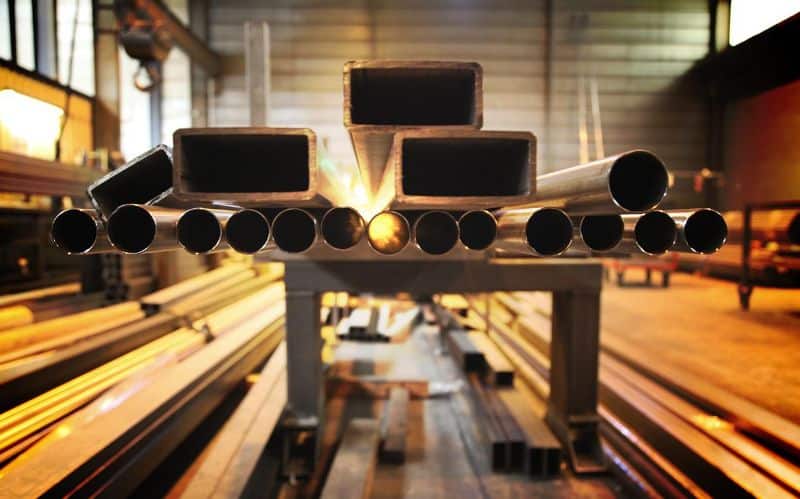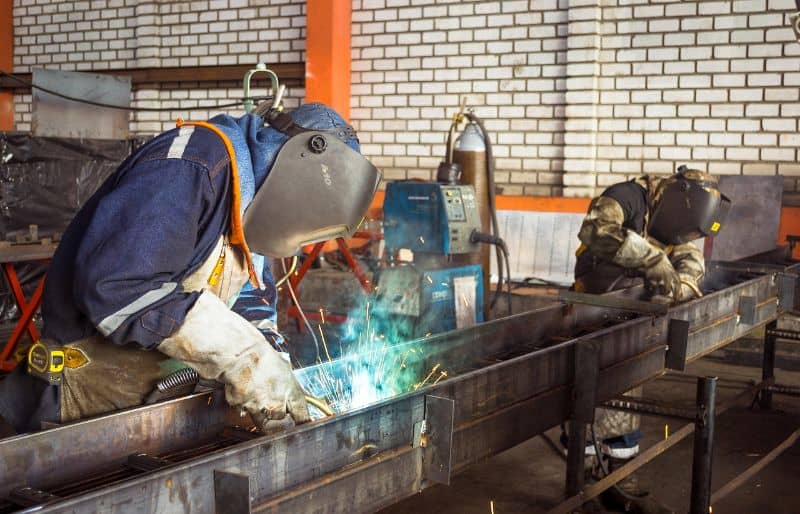Are you looking for where to buy aluminum and steel building materials for building your own homemade trailer?
Finding your own metal materials can be stressful. If you buy metals from the wrong source, you could pay more than the finished frame is worth! Thankfully, you have options.
This guide is for sourcing metal materials only! If you’re looking for a guide to shopping for trailer parts and equipment, please go here!

Why Is Metal So Expensive to Ship?
The primary challenge with sourcing metal is that it’s BIG and it’s HEAVY. And the U.S. Postal Service doesn’t like either of those things. So shipping bulk metal materials over long distances becomes very expensive, very quickly.
Secondly, metal is usually shipped on a custom-built skid or pallet made with cheap, rough-sawn lumber. If you were a commercial customer, you could arrange to have the skid returned to the seller. Since you’re a retail customer, you’ll pay for both the material AND the shipping skid.
Long extrusions only compound this problem. Anything over 108” long can’t be shipped by a package carrier service like UPS Ground or FedEx Ground. Instead, you’ll have to ship LTL freight. And the cost of LTL freight is often based on overall dimensions rather than weight. This means that your 24-ft x 3-ft skid, which might only hold 2-3 lengths of steel, still takes up a lot of space, and costs a lot of money!
A Hot Hint on Receiving LTL Freight
If you live in a house or apartment complex that can receive LTL freight (semi truck), then you can order full mill lengths (20-25 feet) of material. If not, then you’re restricted to ground shipping, normally limited to 108 inches.
However, some freight carriers will require that you have a loading dock. Otherwise, they A) won’t deliver or B) will charge an unloading fee.
If you find yourself without a loading dock, you’ll have to get creative. You’ll need to call a local manufacturing company (hopefully through a mutual friend) and ask if you can schedule a delivery at their facility. Many businesses will say yes, as long as you promise to pick up the material ASAP.
What Kind of Metal Do I Need to Build a Trailer?
If you’re building a simple welded steel trailer, you’ll need structural A500 steel for the main rails, cross members, bumpers, and tongue rails. Typically, these parts will be made from Hollow Structural Steel (HSS) or C-channel.
You might also need material for outriggers, torsion bars, sides, ramps, and other features. Angle iron is a common choice.
If you’re building a bolt-together aluminum trailer, you’ll need structural 6061-T6 aluminum for the main rails, cross members, bumpers, and tongue rails. Typically, these parts will be made from structural aluminum tubes.
You might also need material for outriggers, torsion bars, sides, ramps, and other features. 6061-T6 aluminum angle is commonly used for these purposes.
Where Can I Purchase Metal Equipment for a Trailer?
1) Work with a Local Trailer Repair Shop
Even if you plan on crafting a trailer yourself, it’s wise to make friends with a local truck n’ trailer repair shop. These companies likely have dealership accounts with Redneck, Trailer Parts Depot, NAPA Auto Parts, or other trailer parts distributors.
Truck n’ trailer shops don’t like to tie up tens of thousands of dollars in needless inventory. So they’ll typically only stock commonly used parts and extrusions. If you’re looking for a common size, like 3×2-in tube or 3×2-in angle, you’ll likely hit the jackpot.
Also, your local shop may be an excellent source for larger items that are expensive to ship individually. For instance, you may get a good deal purchasing an axle kit or tires and rims.

2) Contact a Local Welding or Fabrication Shop
Working with a welding or steel fabrication shop is similar to working with a trailer repair shop. While they probably don’t advertise to the public, many of these companies will happily sell you a few thousand dollars worth of parts as a community favor.
You can even ask to have the shop cut the parts to length or size! Just don’t expect complete accuracy. Don’t ask for cuts more accurate than +/- 1-inch. Do the fine finish work yourself.
Ask about drops or remnants. All fabrication shops have cast-off material they couldn’t use for their projects, either because it was imperfect or simply too short. You should never use downgraded/rejected metal, but there’s no harm in using metal with cosmetic flaws. You can often score a good deal on cast-off material.
3) Purchase the Parts Online
Buying parts online is a fast, trustworthy process. Personally, I have probably purchased more than $30,000 worth of metals from online retailers, and I’ve almost never been disappointed.
Online Metals Distributors
If you’re shopping for bulk material, check out an online metals distributor. These companies ship LTL freight from regional warehouses to retail customers. Most will cut your stock to size, although minimum quantities may be required.
Shipping cost is dependent on how far your location is from their closest warehouse, so get at least 2-3 quotes before making a decision. You might also have a dominant regional metals supplier in your area, which could be even cheaper.
- Metals Depot
- Online Metals
- Metals Supermarket
Online Industrial Supply Companies
If you’re shopping for small quantities of specialty metal parts, you might do better with an online industrial supply company. These MRO suppliers are best described as the “Amazons of manufacturing,” with everything from plumbing fittings to industrial adhesives to bulk materials.
Fair warning: Metal prices from MRO suppliers isn’t cheap! But if you only need a few feet of stainless steel rod or maybe a 2×2-ft section of expanded metal mesh, then you can purchase only what you need.
- McMaster-Carr
- Grainger
- Zoro
- Fastenal*
*Unlike most industrial supply companies, Fastenal maintains brick n’ mortar stores. If you want to meet with a real, live person, stop in. You may be required to set up an account, however.
4) Find the Material Used or Secondhand
If you’re a bargain hunter or an I-trade-no-cash sort of guy, you may be able to hunt down most of your parts and equipment locally. Many trailers rusting away in a field can be scavenged for their raw materials or other components, like an A-frame jack.
Personally, I don’t recommend this strategy for finding metal. You never know what stresses a used piece of metal has endured. Don’t trust used/secondhand metal for structural frames.
5) Buy Small Parts at a Home Improvement Store
You can buy small quantities of metal at Tractor Supply, Lowes, Home Depot, and other home improvement stores. However, the selection is extremely limited: steel rods, small hot-rolled angles, flat bars, partial sheets, stainless steel tubes, etc. You won’t find the robust HSS tube or C-channel necessary for constructing a trailer.
***
To recap, I recommend beginning by contacting a local metal fabrication shop or metals distributor. If you can’t get what you need from a local company, get 2-3 quotes from an online metals distributor. And if still need a handful of small parts, visit an industrial MRO supplier like Zoro.
Leave a Reply